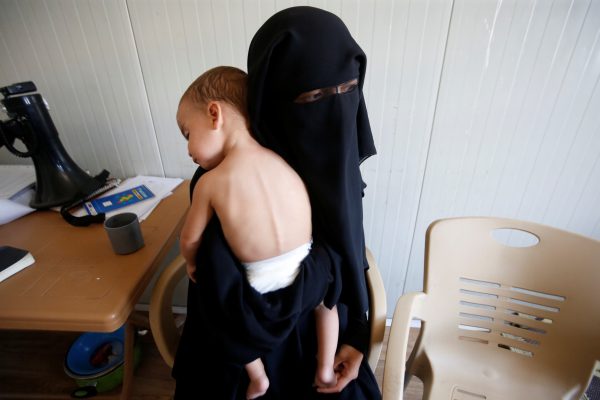Between April 2013 and June 2018, women from 51 countries lived in ISIS-held territory in Syria and Iraq. According to estimates, at least 9,401 women and children joined the group. Yet most counterterrorism programs focus on men and ignore the real threats posed by women.
My new book, “Insurgent Women: Female Combatants in Civil Wars,” examines the many ways women contribute to non-state armed groups like ISIS. “Insurgent Women” focuses on women’s participation in the conflicts in Colombia, Ukraine, and the Kurdish regions. It also offers important insights on how to respond to the thousands of women who have joined Salafi-Jihadi groups. Here are three takeaways:
1) It’s not just about who holds a gun. Women contribute to terrorist groups in a variety of ways.
The family can be a key site of both radicalization and terrorist recruitment. Once settled in territory held by ISIS, the women of the “Caliphate” raised children and gave birth to at least 730 new ones. Women play an essential role educating their children and, in recent cases, using them in terrorist attacks. Last May, three families were involved in coordinated terrorist attacks in Indonesia. A total of eight children died alongside their parents.
Because ISIS enforced the separation of sexes, few women were permitted to take up arms. However, under ISIS, women served as doctors, recruiters, fundraisers, propagandists, and as part of the morality police. The operational contributions made by women are often critical to an armed group’s success. Women who played important roles as propagandists and recruiters for ISIS may do so upon their return home, building and supporting new terrorist networks.
2) Women may be more committed to the cause than men.
While some women were forced to travel to Iraq and Syria by their husbands or other male relatives, many went willingly. Despite the outsized media attention to “jihadi brides,” research suggests that Western women joined ISIS for largely the same reasons as male recruits. This means that they are as, if not more, committed to ISIS’s ideology.
In Colombia — the most recent example of efforts to demobilize rebel groups — women were less likely to demobilize from the FARC than men. Data on global ISIS returnee flows suggests this phenomenon is not limited to Colombian women. Only 5 percent of women who traveled to Syria or Iraq since April 2013 had returned by June 2018, compared to 19 percent of men. Extensive exposure to ISIS propaganda and an apparent willingness to travel to an active war zone mean that these women may still be held under the spell of the group’s violent ideology.
3) ISIS women pose a distinct challenge for post-conflict justice and reintegration.
Authorities in Syria and Iraq are struggling to deal with the thousands of women and children who were detained as ISIS’s territorial control collapsed. In August 2017 alone, Kurdish forces detained 1,400 ISIS-affiliated women and minors in Iraq. At the same time, dozens of countries in Europe, Asia, Africa, and the Middle East are faced with a pressing challenge: whether — and if so, how — to repatriate and reintegrate these women and their families.
The international community’s response to ISIS “returnees” has been decidedly mixed. Many Western countries have preferred to have their female nationals tried where they were detained, rather than extraditing them. Women linked to ISIS have received life sentences in Iraq. Some countries, including the United Kingdom, have revoked the citizenship of would-be returnees. Others, including Canada, argue they must bring terrorists home even though those linked to ISIS are unlikely to face justice.
Efforts to reintegrate women and child returnees will also need to take into account the domestic violence, sexual violence, and sexual slavery that occurred under ISIS’s brutal regime. Exposure to violence, physical or sexual, is an identified risk factor for domestic violence. Governments and civil society must work to ensure that we do not repeat the mistakes of past reintegration efforts which overlooked the important roles played by women. ISIS may have lost its territory, but the struggle to reintegrate its female members is far from over.
“Insurgent Women: Female Combatants in Civil Wars” (Georgetown University Press, 2019) is now available for purchase.
Feature Photo: A foreign wife of Islamic State militants holds her child at Hammam Al-Alil camp in south of Mosul, Iraq September 13, 2017. Reuters/Azad Lashkari.































